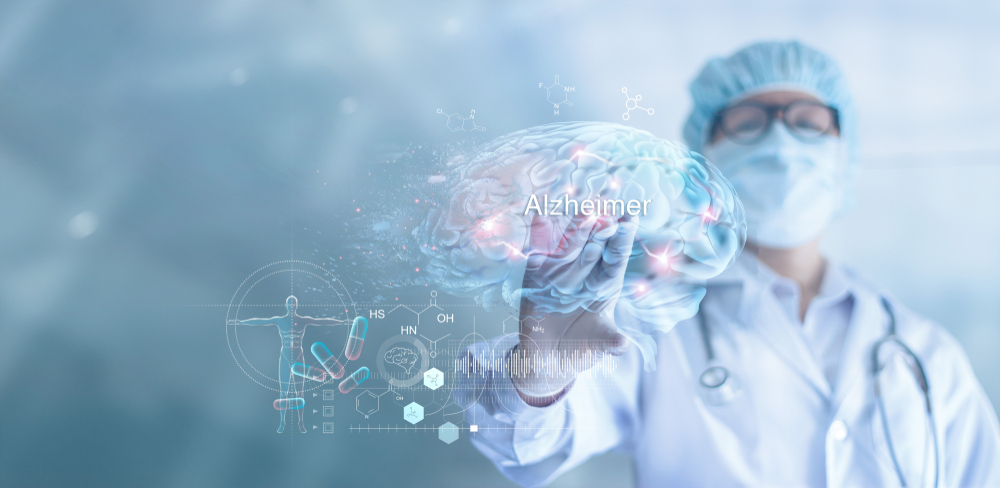Alzheimer's Disease

Alzheimer's disease is a devastating neurologic condition that progressively affects brain function, leading to the death of brain cells and brain shrinkage. Alzheimer's disease is the most common cause of dementia and is characterized by a gradual decline in mental, behavioral, and social abilities that impair a person's capacity for independent functioning.
Individuals with Alzheimer's disease may experience initial symptoms such as forgetting recent conversations or experiences. However, as the disease worsens, severe memory loss becomes a common occurrence, making it challenging to perform even the simplest of tasks.
Fortunately, medications and therapies are available to slow down the progression of the disease and alleviate symptoms. Such therapies can enable individuals with Alzheimer's disease to maintain their independence and optimize their cognitive and functional abilities.
Symptoms:
Alzheimer's disease has three distinct phases of symptoms.
- Early symptoms: The primary symptom of Alzheimer's disease in its early stages is memory lapses. A person with early Alzheimer's disease might forget recent conversations or events, misplace things, forget names of places and things, be unable to come up with the correct phrase, ask questions often, demonstrate poor judgment, or struggle to make judgments. Frequent indications of mood shifts, such as escalating agitation or worry or intervals of bewilderment may also occur.
- Middle-stage symptoms: Memory issues will worsen as Alzheimer's disease progresses. The middle-stage symptoms might include growing confusion and disorientation, delusions, or feeling distrustful of caregivers or family members Issues with language or speaking (aphasia), difficulties with spatial activities, and some vascular dementia symptoms may also occur.
- Later symptoms: The symptoms of Alzheimer's disease worsen as it progresses, and as it worsens, other signs and symptoms might appear, including difficulties moving or shifting positions without help, speech deterioration, severe issues with both short- and long-term memory, and eating and swallowing challenges.
Alarming factors:
Alzheimer's disease is a progressive neurodegenerative disorder that can have significant and alarming effects on an individual's cognitive and physical abilities. Some of the most alarming factors associated with Alzheimer's disease include the gradual loss of memory, language skills, and the ability to perform everyday tasks. As the disease progresses, individuals may also experience changes in mood and behavior, including depression, anxiety, and aggression. Additionally, Alzheimer's disease is irreversible and can lead to severe disability and, ultimately, death. These factors make early detection and management of the disease critical for improving outcomes and quality of life for affected individuals and their families.
Diagnosis:
Advancements in modern medicine have enabled doctors and researchers to accurately diagnose Alzheimer's disease while a person is still alive, contrary to traditional methods that required post-mortem examination of the brain to identify the distinctive plaques and tangles associated with the disease.
To properly diagnose Alzheimer's disease, doctors will typically perform a series of tests and evaluations, including a physical and neurological examination. During the physical exam, the physician will evaluate various aspects of neurological health, including reflexes, muscle mass and strength, coordination, and balance. Lab tests, such as blood tests, may also be conducted to rule out other possible causes of forgetfulness and disorientation, such as thyroid conditions or vitamin deficiencies.
Neuropsychological testing and mental health assessments are also commonly used to evaluate memory and cognitive abilities. Quick mental status tests may provide initial information, while longer neuropsychological testing procedures can offer more comprehensive assessments of mental function relative to age and educational level.
Brain imaging is another diagnostic tool used to identify Alzheimer's disease and other cognitive-related diseases. While traditional brain imaging methods, such as MRI, CT scan, or PET scan, are primarily used to identify external abnormalities, new imaging techniques can detect specific brain abnormalities caused by Alzheimer's disease. These newer imaging techniques are mainly utilized in academic medical centers or clinical trials to identify the early onset of the disease.
Treatment:
While there is no cure for Alzheimer's disease, there are treatments available to manage symptoms and slow the progression of the disease. Medications such as cholinesterase inhibitors and memantine can help improve cognitive function and manage behavioral symptoms. Additionally, lifestyle changes such as exercise, a healthy diet, and social engagement can also help improve cognitive function and quality of life for individuals with Alzheimer's disease. Caregiver support and education are also essential components of treatment, as they can help individuals with Alzheimer's disease and their families manage the physical, emotional, and financial challenges of the disease. Ongoing research is also focused on developing new treatments and therapies to improve outcomes for individuals with Alzheimer's disease.
Conclusion:
Finding out a loved one suffers from Alzheimer's disease can be a difficult experience. Be assured that their medical staff will guide them and you through the procedure and offer tailored treatment alternatives. It's crucial to look after oneself as well. Consider developing your support network or participating in support groups.






